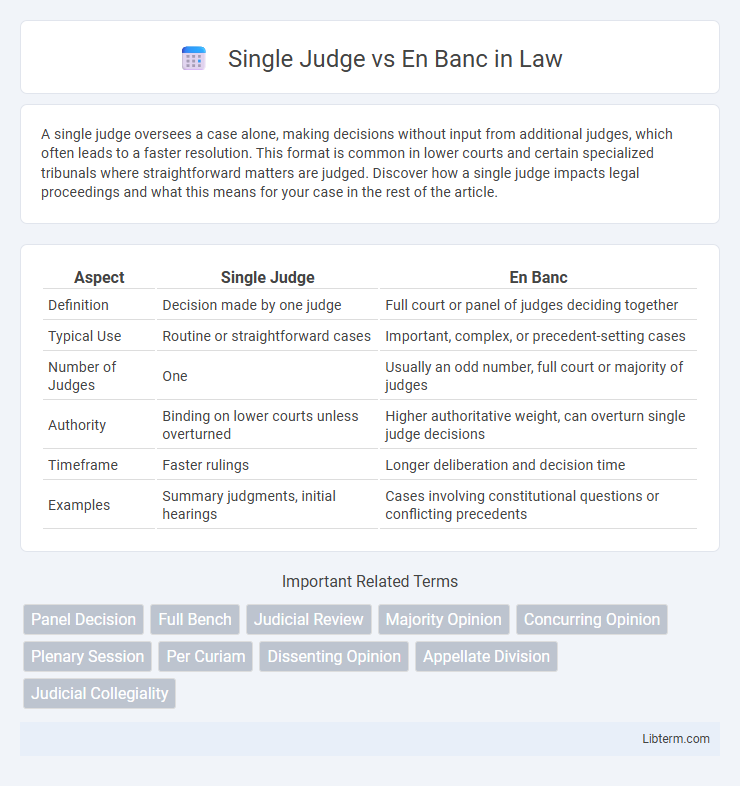A single judge oversees a case alone, making decisions without input from additional judges, which often leads to a faster resolution. This format is common in lower courts and certain specialized tribunals where straightforward matters are judged. Discover how a single judge impacts legal proceedings and what this means for your case in the rest of the article.
Table of Comparison
| Aspect | Single Judge | En Banc |
|---|---|---|
| Definition | Decision made by one judge | Full court or panel of judges deciding together |
| Typical Use | Routine or straightforward cases | Important, complex, or precedent-setting cases |
| Number of Judges | One | Usually an odd number, full court or majority of judges |
| Authority | Binding on lower courts unless overturned | Higher authoritative weight, can overturn single judge decisions |
| Timeframe | Faster rulings | Longer deliberation and decision time |
| Examples | Summary judgments, initial hearings | Cases involving constitutional questions or conflicting precedents |
Introduction to Single Judge and En Banc Panels
Single Judge panels consist of one judge who delivers rulings on cases, providing quicker decisions in routine or less complex matters. En Banc panels, composed of all active judges of a court, handle cases requiring reconsideration of precedents or addressing significant legal questions. This structure ensures a balance between efficient case resolution and comprehensive judicial review.
Definition of Single Judge Proceedings
Single judge proceedings involve a single judicial officer who reviews and decides cases individually, typically addressing preliminary matters or summary decisions. This method streamlines the judicial process by allowing faster resolutions without convening the full bench. It contrasts with en banc sessions, where all judges of a court collectively hear and decide significant or complex cases.
Definition of En Banc Hearings
En banc hearings refer to sessions in which a case is heard before all the judges of a court, rather than by a panel of selected judges, typically used in appellate courts to resolve conflicts in decisions or address significant legal issues. This procedure ensures a comprehensive review, allowing the full court to consider the case's merits collectively. En banc review is often reserved for cases that require uniformity in the law or involve questions of exceptional public importance.
Key Differences Between Single Judge and En Banc
Single judge cases involve one judge reviewing and deciding on a matter, resulting in faster resolution and limited scope of review. En banc refers to a full panel of judges hearing an appeal together, providing a comprehensive review and addressing complex or significant legal issues. The key differences between single judge and en banc proceedings lie in the number of judges involved, the depth of legal analysis, and the potential impact of the ruling.
Criteria for Assigning Single Judge Cases
Criteria for assigning single judge cases often include the complexity of the legal issues, urgency of the matter, and the specific rules of the jurisdiction or court. Typically, routine cases or procedural matters are delegated to a single judge to expedite decisions, while cases involving significant legal questions or constitutional issues may be reserved for en banc review. Courts rely on established guidelines and judicial discretion to determine whether a single judge or the full bench is appropriate for fair and efficient case resolution.
Situations Requiring En Banc Review
En banc review is required in cases involving conflicts in legal interpretations among panel decisions or issues of exceptional public importance that demand uniformity in the law. Situations necessitating en banc hearings include correcting or preventing miscarriages of justice, resolving questions that affect a broad range of cases, and addressing matters where the panel's decision contradicts precedents set by the full court. This process ensures authoritative legal rulings and maintains consistency across judicial decisions in appellate courts.
Advantages of Single Judge Proceedings
Single judge proceedings offer expedited case resolution and reduced judicial backlog by streamlining decision-making through a single adjudicator. These proceedings enhance consistency and predictability in rulings, particularly in routine or less complex matters, due to the focused expertise of one judge. Cost efficiency is another advantage, as single judge hearings minimize procedural delays and resource consumption compared to en banc sessions involving multiple judges.
Advantages of En Banc Hearings
En banc hearings involve the entire panel of appellate judges, enhancing the thoroughness and consistency of judicial decisions. They provide a broader range of judicial perspectives, reducing the risk of errors or biased rulings inherent in single-judge hearings. This collective review process is crucial in cases with significant legal implications or conflicting precedents, ensuring uniformity and stability in the law.
Impact on Legal Outcomes
Decisions by a single judge typically reflect individual judicial interpretation, which can lead to faster but less diverse legal reasoning, potentially affecting consistency in case law. En banc panels, comprising multiple judges, provide a broader judicial perspective, enhancing the thoroughness and stability of legal outcomes through collective deliberation. This collaborative approach tends to produce more authoritative and uniform rulings, influencing precedent and courtroom strategies significantly.
Conclusion: Choosing the Right Judicial Approach
Selecting between a single judge and en banc review hinges on the complexity and impact of the case, with single judges providing efficiency for routine matters while en banc panels offer comprehensive deliberation for significant legal questions. En banc proceedings enhance legal clarity by resolving circuit splits and ensuring uniform application of the law across jurisdictions. Courts must balance resource allocation and judicial consistency to determine the most effective approach for delivering fair and authoritative decisions.
Single Judge Infographic

 libterm.com
libterm.com